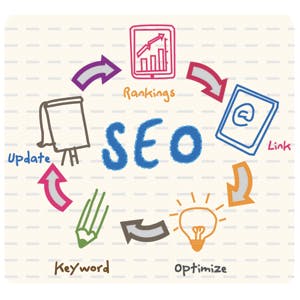Did you know inbound marketing and search engine optimisation go hand-in-hand? The reason for this is simple – if you don’t get your SEO right, potential customers will struggle to find your website.
Last week we talked about choosing the three to five keyword phrases most appropriate for your business – now it’s time to position them in the right places on your website.
Let’s refer back, to where we compared your website to a retail store. If you were running a retail store, you’d never have your window display at the back of the shop where people walking in a shopping centre couldn’t see it. It’s the same premise for SEO – placing your keywords in your website’s page title and tagline ensures Google can easily see what your site’s about and display that information on search engine results for people to click on. This is essentially what search engine optimisation (SEO) is all about.
There are two different types of SEO. On-page SEO relates to how well your website’s content is presented to the search engines. Off-page SEO looks at your website’s overall “authority” on the internet, which is determined by what other websites say about your website. It’s a bit like a popularity contest – if you have lots of people posting positive comments on Facebook with links back to your website this can increase the ranking of your website.
Ideally, the best place for your website to rank is on Google’s first page. Let’s again think of it in terms of our foot traffic in shopping centre analogy – a shop on the top floor in the back corner isn’t as likely to get as many sales as a shop next door to the supermarket, is it? This is why it’s essential you get your SEO right.
Here are the key areas of on-page website optimisation:
1. Page Title
This is the text you see at the top of your internet browser and are the titles of the pages presented in the search engines. They can be found and edited in your website’s HTML. The text in between <title> is where you’ll find it.
2. Meta Description
Meta tags and descriptions don’t have a direct influence on search engine rankings, but it is the text that comes up about a site in a Google search. These do work towards attracting the attention of web searchers though, and a good Meta description could get them clicking through to your website.
3. Headings
Search engines are more likely to read text in the headings as keywords, instead of the information contained on the rest of the page (it’s a bit like the they’re skimming!) This makes vital to have all the pages on your website named with your three to five chosen keywords.
4. Images
Google can’t see images, it can only see the text that describes the images on your page, which makes it very important to choose images you can rename in relation to your keywords. This also means you should always provide a literal description of an image you use on your site, to help Google better understand what’s on your web pages.
Remember not to over-use your keywords. This is also known as keyword stuffing and is something Google frowns upon – you should be writing content for human eyes, not based on the fact you want to rank well on search engines.
How off-page SEO works with inbound links
The quality of the websites that link to your site is also a very important part of your SEO strategy.
Google announced some changes recently that mean it boosts the overall ranking of your site when people like your website or blog posts on Facebook, or if they Tweet a reference pointing back to your website.
Small businesses need to be very careful when hiring an SEO company to help them rank on Google’s first page. You need to be sure they’re using the legitimate strategies we’ve covered today, otherwise your website won’t just see the same number of visits – you could also end up getting reprimanded by Google which is called a “slap”.
If you’re not sure your website has been set up in the right way, or think it might have keywords missing from the right areas, we can provide you with a free website audit. Just drop us a line to sales@getfocusedconsulting.com.au with the subject line “Free Website Audit”

